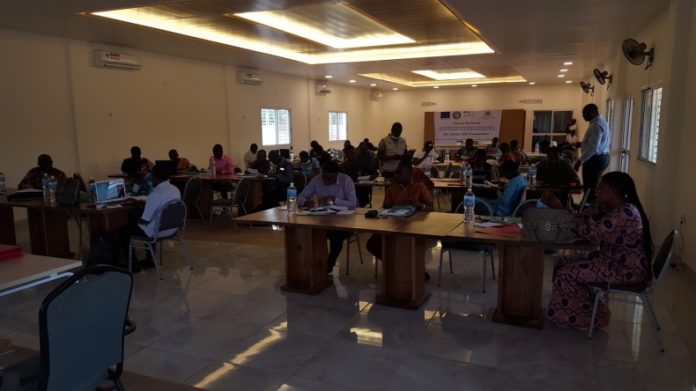By Foday Moriba Conteh
From the 10th to the 12th April 2020 a training programme was conducted, targeting Health Reporters and one Health Communication Officer on Emergency Risk Communication during crisis and disease outbreaks. The training took place in Kenema District and was sponsored by the European Union (EU) with the German Agency for Technical Cooperation (GIZ) serving as implementing partner.
Dr. Amadou Traore, GIZ Technical Adviser for Regional Support to Pandemic Prevention Programs to ECOWAS, on behalf of GIZ, thanked participants for being part of the training.
He said the training is aimed at capacitating health reporters and one Health Communication Officer furthering how it was occurring against the backdrop of an unprecedented COVID-19 pandemic spread worldwide that started in China in December last year, to sweep across all 5 continents in a space of few weeks, claiming thousands of deaths, shutting businesses down, causing precipitous economic decline and waves of social distress.
In such a context, he went on, Risk Communication is proven to play an important role in fostering community engagement and mobilization toward healthy behavioral and risk minimizing choices that will save lives.
He added that within the One Health Concept, journalists are better allies of Government in furthering Risk Communication activities; hence the support of GIZ to the training activity GIZ is doing in furtherance of its support to the Regional Pandemic Prevention Program (RPPP) in the ECOWAS region, with funding from BMZ and the European Union.
The RPPP program, he said ,focuses on 4 interventions areas:
- Communication on health risks and gender sensitivity in the ECOWAS region, within the one-health framework.
- Inter-institutional Communication and coordination among the ECOWAS Commission, specialized institutions, bodies and Member States in the fight against epidemics.
- HR capacity building in terms of PHE Prevention detection and or response within the ECOWAS region.
- Digital surveillance and outbreak management in Nigeria and Ghana.
According to Dr. Amadou Traore, in order to strengthen the knowledge and skills of ECOWAS One Health Sector professionals including journalists in these areas, two training programs pertaining to the main areas of the work of the RPPP were developed, namely emergency risk communication and inter-institutional communication and coordination.
As part of this strategy, a Training of Trainers (ToT) was organized by GFA Consulting Group on behalf of GIZ in collaboration with the Regional Institute of Public Health (IRSP). The aim of the ToT was to increase the pool of regional experts with the knowledge and skills needed to cascade these courses at ECOWAS member states level.
“This particular training will impart in you risk communication knowledge and skills as a result of which you will become better contributors to the Government of Sierra Leone’s efforts of responding to Public Health Events such as the current COVID19 Pandemic, the fight against which is a shared responsibility.”
Dr. Amadou also thanked the Sierra Leone Government, through the Ministry of Health and Sanitation and all the MDAs, of the One Health referential for the appointment of participants who progressively continue to replicate the trainings in Sierra Leone.
He expressed hope that participants will seize the rare opportunity to acquire/improve their knowledge and skills in Risk Communication to be able to timely and effectively contribute to the containment of epidemics in Sierra Leone and in the ECOWAS region as a whole.
Emmanuel A.B. Turay, Acting Director, Ministry of Information and Communications spoke about the objectives of the training and said they consider the media as a key tool in the dissemination of information.
He emphasized that, Sierra Leone is not just fighting a pandemic but “infodemic” and called on all to come together as media practitioners to fight fake news (Infomedic).
He also urged Health Journalists to take the training serious and for it to serve as a training of trainers as they represent other media houses.
Victoria V. Bernard, the Sierra Leone Association of Journalists (SLAJ) Eastern Regional Chairperson, said they were grateful to the Government and donors for the training. She pointed out that specialized trainings like those are welcomed.
While appealing to Journalists to take the training serious, she said misinformation was what they experienced during the Ebola epidemic but commended the moves so far taken by the Government through the Ministry of Information and Communications.




